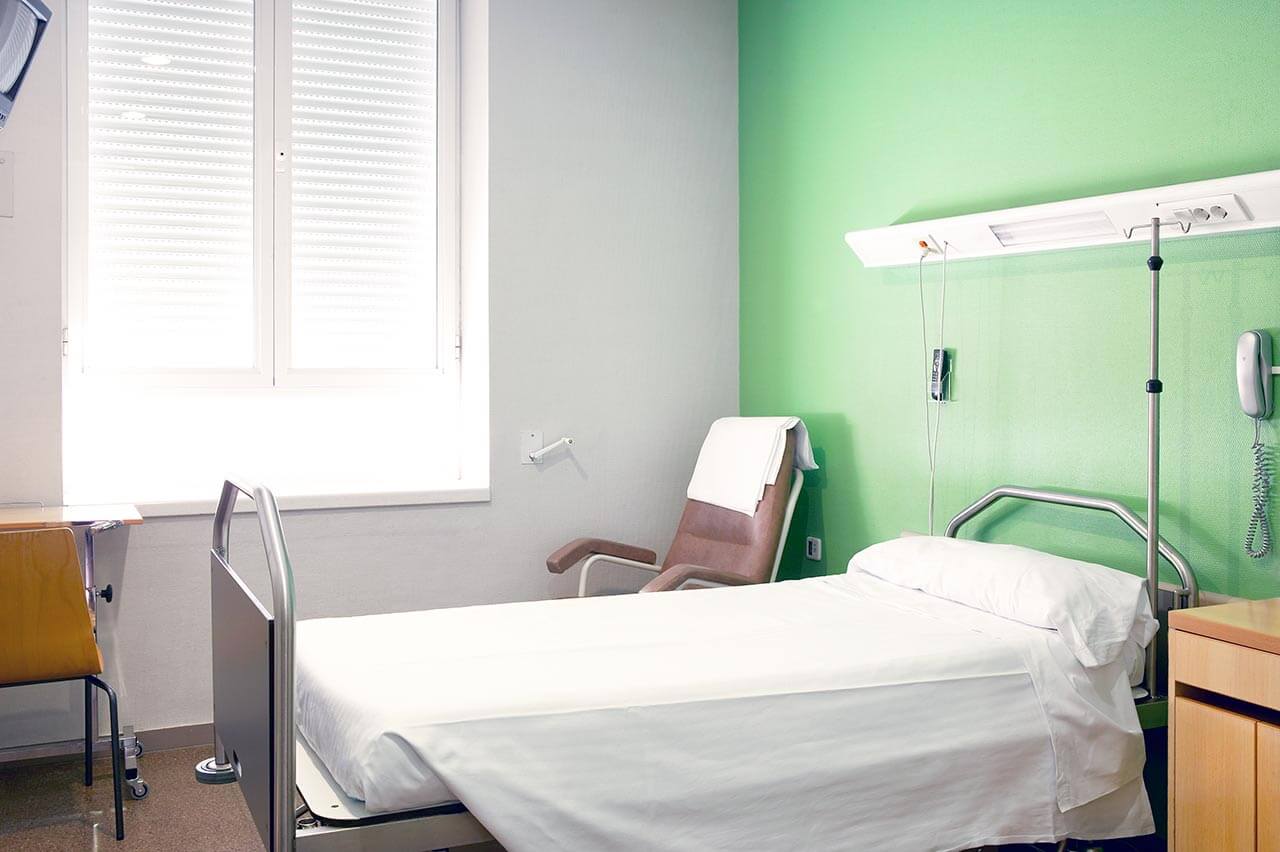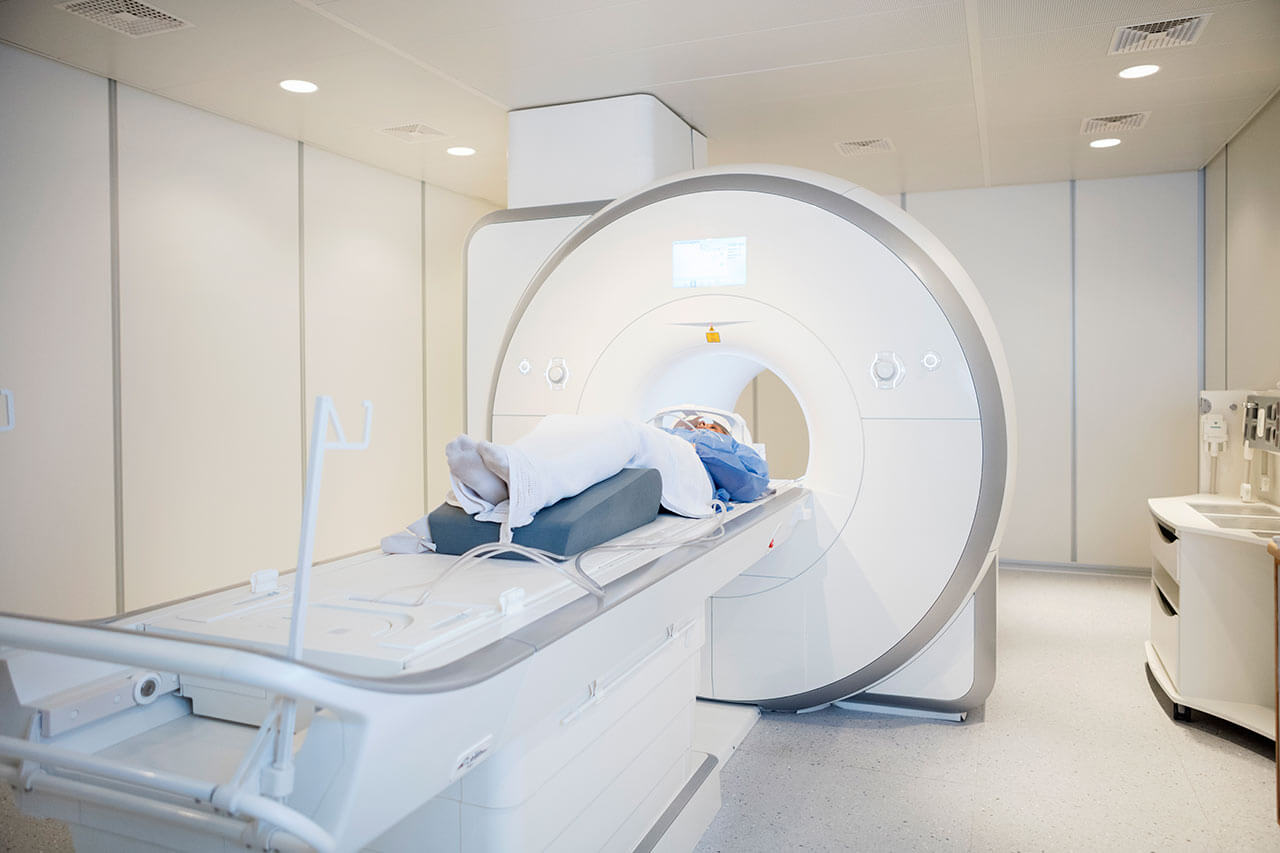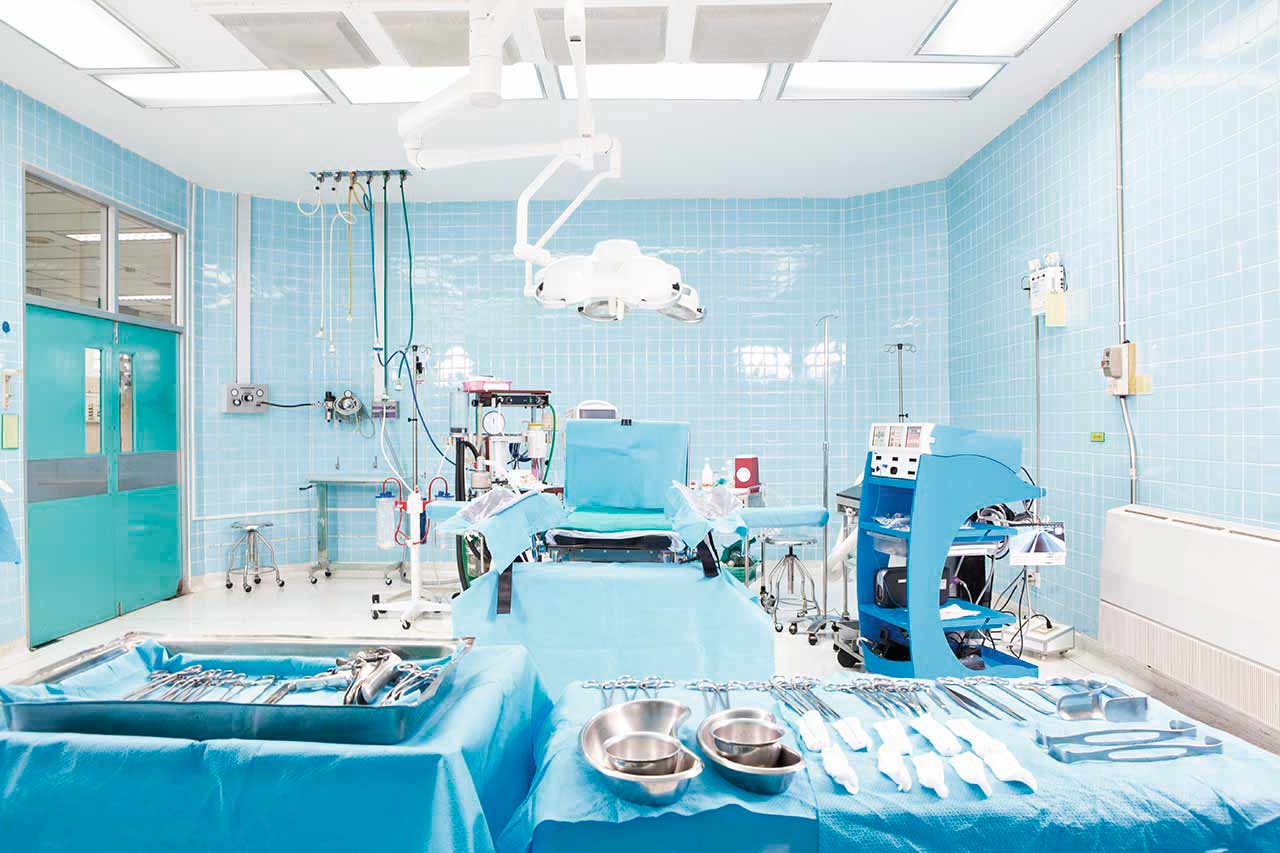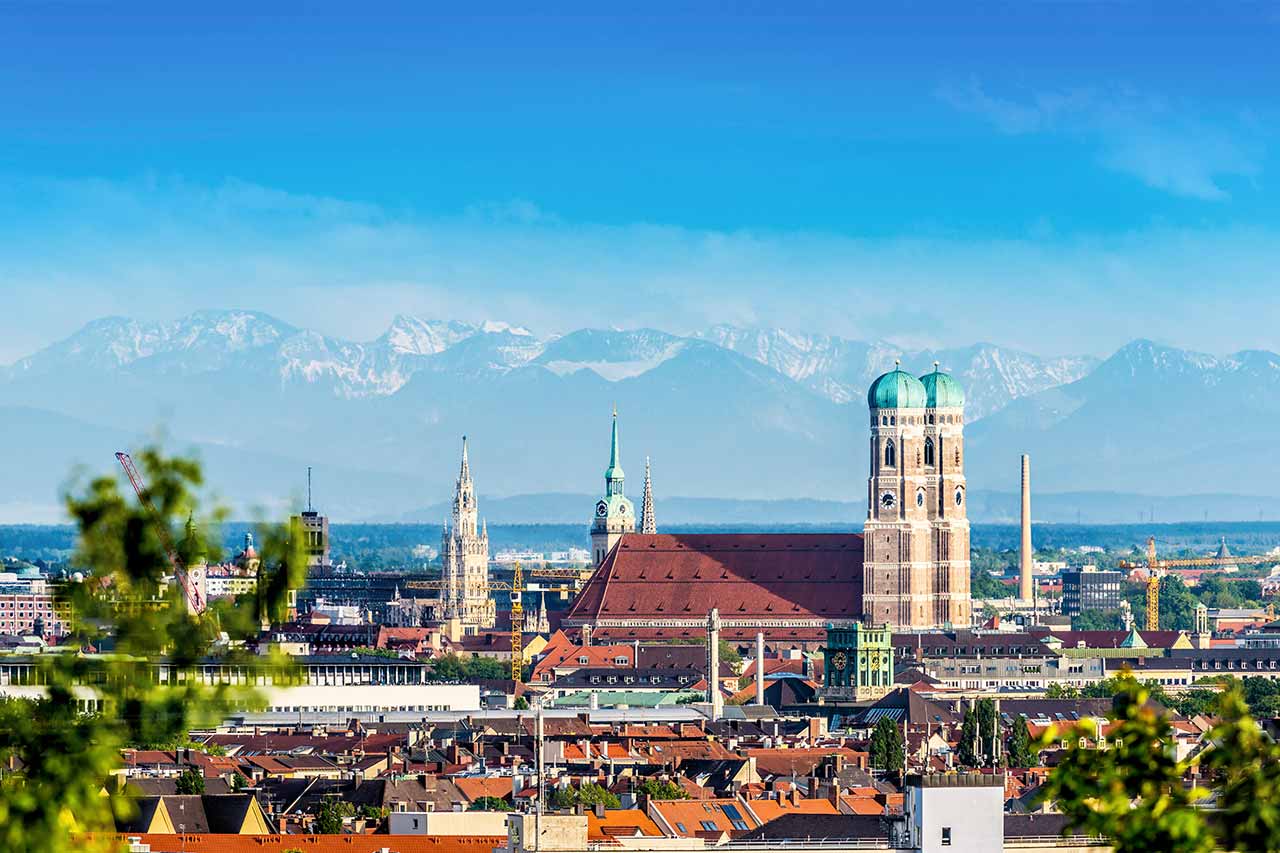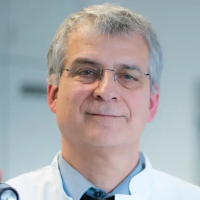
The program includes:
- Initial presentation in the clinic
- clinical history taking
- review of medical records
- physical examination
- laboratory tests:
- complete blood count
- biochemical blood analysis
- inflammation indicators
- indicators of blood coagulation
- immune status (IgE)
- skin scratch/prick tests
- x-ray chest examination
- lung function analysis
- bronchoscopy with biopsy bronchoalveolar lavage
- fluid examination
- microbiological examination of bronchial secretion
- nursing services
- consultation of related specialists
- differential diagnosis of other diseases of the lung
- consultation of the chief physician and all leading experts
- development of individual treatment plan
Required documents
- Medical records
- Bronchoscopy and biopsy (if available)
Service
You may also book:
 BookingHealth Price from:
BookingHealth Price from:
About the department
The Department of Pulmonology at the University Hospital of Ludwig Maximilian University of Munich provides the full range of diagnostic and therapeutic services to patients with diseases of the lungs, bronchi, and upper respiratory tract. The department's areas of specialization include the treatment of bronchial asthma, chronic obstructive pulmonary disease, interstitial lung disease, cystic fibrosis, and pulmonary hypertension. Doctors have rich clinical experience in treating lung cancer, pleural mesothelioma, and malignant mediastinal tumors. The department's team of doctors conducts conservative therapy and performs interventional procedures on the chest organs (more than 1,200 bronchoscopy procedures every year). If a patient requires a major surgery, thoracic surgeons will be involved in the therapeutic process. The department has modern equipment, Intensive Care Units, and an advanced Sleep Laboratory. The health of patients is in the safe hands of a highly qualified team of 28 doctors. The medical facility has 41 beds to accommodate patients. The department is headed by Prof. Dr. med. Juergen Behr.
The treatment of bronchial asthma is one of the priority clinical tasks of the department's doctors. Bronchial asthma is a chronic disease caused by bronchial obstruction. The pathology is manifested by acute attacks of asphyxia and coughing. Despite the outstanding achievements of modern medicine, bronchial asthma is still classified as an incurable disease. Therapeutic measures are aimed at maintaining a high quality of life. A treatment regimen is prescribed based on the particular type of disease. Pulmonologists working in the medical facility usually provide symptomatic treatment with pills and inhalers. Advanced biological therapy is also available here. Physiotherapeutic procedures, including oxygen therapy, therapeutic exercises, and massage, also contribute to a good treatment outcome.
The department includes a specialized Center for Interstitial Lung Disease and Rare Lung Diseases (ZISLE), where patients with these pathologies can receive the most effective therapy. Interstitial lung disease is a group of pathologies that cause the formation of "scars'' on the lung tissue. Due to such pathological changes, it becomes difficult for a person to get enough oxygen. The most common symptoms of interstitial lung disease are shortness of breath and a dry cough. These symptoms are non-specific, so the department's specialists devote much time to comprehensive diagnostics of the patient's respiratory tract. Patients may undergo blood tests, pulmonary function testing, bronchoscopy, and imaging tests (X-ray, CT, or MRI scans). The required complex of diagnostic tests is prescribed on an individual basis, based on a patient's anamnesis and complaints. With the diagnostic results, the department's pulmonologists prescribe the optimal drug therapy and oxygen therapy. Lifestyle modification also plays an important role in the therapeutic process. Doctors recommend smoking cessation, regular physical exercise, and weight loss (if a person is overweight). The last-line therapy is a lung transplant. The surgical intervention will be performed in a specialized Transplant Center by experienced surgeons.
An important focus of the department's clinical practice is the treatment of cancers in the chest organs, such as lung cancer, pleural mesothelioma, and mediastinal tumors. The above-mentioned pathologies are diagnosed and treated in a highly specialized center certified by the German Cancer Society (DKG), which is part of the Comprehensive Cancer Center Munich. Advanced examinations are available for accurate diagnostics, including laboratory tests, X-ray, endobronchial ultrasound (EBUS), bronchoscopy, biopsy, CT, MRI, and PET scanning. After the completion of comprehensive diagnostics, its results are considered by an interdisciplinary tumor board with the participation of pulmonologists, thoracic surgeons, oncologists, and radiation therapists. The specialists develop an optimal treatment regimen, which may include resection of the tumor or a part of the lung affected by the oncological process (laser techniques, video-assisted thoracoscopic techniques, and open techniques), chemotherapy, radiation therapy, and other modern treatments.
The department's main clinical activities are as follows:
- Diagnostics and treatment of bronchial asthma
- Diagnostics and treatment of interstitial lung disease
- Diagnostics and treatment of chest cancers
- Lung cancer
- Pleural mesothelioma
- Mediastinal cancer
- Diagnostics and treatment of chronic obstructive pulmonary disease (COPD)
- Diagnostics and treatment of cystic fibrosis
- Diagnostics and treatment of pulmonary hypertension
- Diagnostics and treatment of rare lung diseases
- Patient care before and after a lung transplant
- Other medical services
The department's range of diagnostic and therapeutic services includes:
- Diagnostic services
- Pulmonary function testing
- Whole body plethysmography
- Spiroergometry
- Spirometry
- Bronchial provocation test (pharmaceutical)
- Gas composition analysis of arterial and capillary blood at rest and during exercise (bicycle ergometry)
- Diagnostic bronchoscopy
- Flexible bronchoscopy
- Endobronchial ultrasound (EBUS)
- Allergy tests
- Prick tests
- Local allergen-specific provocation of the mucous membrane of the nose and bronchi
- Antigen-specific IgG antibody assessment
- FeNo-measurement of nitric oxide concentration in the exhaled breath
- Examinations in a Sleep Laboratory
- Obstructive sleep apnea screening
- Polygraphy
- Polysomnography
- Complex right heart catheterization for diagnostic purposes
- Imaging tests
- X-ray
- Computed tomography
- Magnetic resonance imaging
- Positron emission tomography
- Pulmonary function testing
- Therapeutic services
- Drug therapy, including innovative biologic drugs
- Oxygen therapy
- Inhalation therapy
- Interventional bronchoscopic procedures
- Endobronchial laser therapy (neodymium YAG laser)
- Bronchial dilatation and stenting
- Endoscopic lung volume reduction
- Automated "afterloading" endobronchial radiation therapy
- Other diagnostic and treatment methods
Curriculum vitae
Higher Education and Scientific Activities
- 1979 - 1985 Human Medicine studies at the Ludwig Maximilian University of Munich, scholarship of the Bavarian Foundation for the Support of Gifted Young People.
- 13.11.1985 Admission to medical practice
- 30.04.1987 Thesis defense with honors, Ludwig Maximilian University of Munich.
- 19.06.1996 Habilitation, Ludwig Maximilian University of Munich.
- 30.07.1996 PD, Internal Medicine, University of Munich.
Professional Career
- 01.01.1986 Fellow, Department of Internal Medicine I, University Hospital of Ludwig Maximilian University of Munich.
- 01.07.1996 Head of the interdisciplinary Sleep Laboratory, University Hospital of Ludwig Maximilian University of Munich.
- 01.06.1998 - 14.01.2001 Acting Head of the Department of Pulmonology, University Hospital of Ludwig Maximilian University of Munich.
- 15.01.2001 - 31.07.2007 Senior Physician of the interdisciplinary Intensive Care Center, University Hospital of Ludwig Maximilian University of Munich.
- 15.01.2001 - 30.11.2012 Head of the Department of Pulmonology, University Hospital of Ludwig Maximilian University of Munich.
- 01.12.2010 - 31.12.2012 Head of the Department of Pulmonology, Allergology and Sleep Medicine, University Hospital Bergmannsheil a the Ruhr University in Bochum.
- 01.01.2013 Head of the Department of Pulmonology at the University Hospital of Ludwig Maximilian University of Munich, Head of the Department of Pulmonology at the Asklepios Munich-Gauting Clinic, Co-Chair of the Comprehensive Pulmonology Center Munich.
- 06. - 10.09.2015 Co-Chair of the Annual Congress of the European Respiratory Society in Munich.
- 22. - 23.01.2016 President of the Congress for Rare Lung Diseases and of the Scientific Working Group on the Treatment of Lung Diseases, Berlin.
- 2019 Appointed as the President of the Annual Congress of the German Society of Pulmonology and Respiratory Medicine.
Main Research and Clinical Focuses
- Interstitial lung diseases, pulmonary fibrosis, and collagenosis.
- Pulmonary hypertension.
- Lung transplantation.
- Diagnostics and treatment of chest tumors.
- Lung diseases caused by allergic reactions.
- Acute and chronic respiratory failure, obstructive sleep apnea.
- Therapy for COPD, including interventional and surgical procedures.
- Inflammatory and oxidative pathological mechanisms of bronchopulmonary diseases.
- Mechanisms of fibrosis and cell-mesenchymal interaction.
Memberships in Professional Societies
- Federal Association of German Internists.
- Professional Association of Pulmonologists of Bavaria.
- German Society of Pulmonology and Respiratory Medicine.
- German Society of Cardiology.
- European Respiratory Society.
- American Thoracic Society.
- International Society for Heart and Lung Transplantation.
- Working Group on Pulmonary Hypertension (DGP and DGK).
- Second Chair of the Scientific Working Group on the Treatment of Lung Diseases (WATL).
- Second Chair of the self-help group for patients with pulmonary fibrosis.
- Scientific Advisory Council of the Self-Help Group for Patients with Pulmonary Hypertension, Pulmonary Emphysema and Pulmonary Fibrosis.
Photo of the doctor: (c) LMU Klinikum
About hospital
According to the Focus magazine, the University Hospital of Ludwig Maximilian University of Munich is regularly ranked among the best medical institutions in Germany!
The hospital is the largest multidisciplinary medical facility, as well as a leading research and training center in Germany and Europe. The hospital is proud of its bicentenary history and tirelessly confirms its primacy at the national and international levels. The outstanding quality of medical care is complemented by highly productive research activities, thanks to which many effective diagnostic and therapeutic methods, saving people’s lives, have been presented in medical practice.
The medical facility includes two main buildings, Grosshadern and Innenstadt. The hospital has 29 specialized departments, 53 interdisciplinary centers, 11 institutes, and many sections. More than 500,000 patients are treated here every year, which indicates the hospital's excellent reputation. A large and highly professional medical team, consisting of 1,800 doctors and 3,300 nursing staff, works for the benefit of patients. The hospital has 2,000 beds to accommodate patients.
The hospital's infrastructure deserves special attention: advanced diagnostic equipment that allows doctors to detect the slightest pathological changes in the human body, the latest operating rooms with highly efficient monitoring systems, robot-assisted surgical systems that facilitate sparing operations, and proper postoperative care.
Excellent technical resources and highly professional medical staff are undoubtedly the hospital's pride, but the medical facility also pays attention to the patient's comfort and to a humane attitude toward their life situation. When providing the necessary medical care, doctors and nursing staff always show a friendly attitude, inform patients in detail about the upcoming diagnostic and therapeutic procedures, gladly answer all questions of interest to patients, and provide moral support during the therapeutic process.
The hospital has many prestigious quality certificates, including a DIN EN ISO 9001 certificate, an IQM certificate, an endoCert certificate, certificates from the German Cancer Society (DKG) for treating various types of cancer, the German Cardiac Society (DGK), the German Society for Orthopedics and Trauma Surgery (DGOU), etc. Thus, patients can count on the best possible treatment outcome due to the use of the most effective and, at the same time, sparing therapeutic techniques.
Photo: (с) depositphotos
Accommodation in hospital
Patients rooms
The patients of the University Hospital of Ludwig Maximilian University of Munich live in comfortable, spacious, single and double patient rooms with a modern design. Each room is equipped with an ensuite bathroom with a shower and toilet. The furnishing of a standard patient room includes a comfortable bed, the position of which can be adjusted using the remote control, a locker for storing personal belongings, a TV, and a telephone. Also, if desired, you can connect to the Internet. In addition, patients can opt for enhanced-comfort rooms, with a safe, a fridge, and upholstered furniture.
The hospital has an excellent infrastructure. The medical facility’s area houses a bank, ATMs, a hairdresser, shops with a wide range of food, drinks, newspapers, magazines, and personal hygiene items, play areas for children, and a beautiful garden for walking, etc.
Meals and Menus
The patient and his accompanying person are offered a daily choice of three menus, including a vegetarian one. If you are on a specific diet for any reason, you will be offered an individual menu. Please inform the medical staff about your dietary preferences prior to the treatment.
Further details
Standard rooms include:
Religion
Religious services are available upon request.
Accompanying person
Your accompanying person may stay with you in your room or at a hotel of your choice during the fixed program.
Hotel
You may stay at a hotel of your choice during an outpatient program. Our managers will help you to choose the best option.
The hospital offers a full range of laboratory tests (general, hormonal, tests for infections, antibodies, tumor markers, etc.), genetic tests, various modifications of ultrasound scans, CT scans, MRI and PET/CT, angiography, myelography, biopsies, and other examinations. Treatment with medications, endoscopic and robotic operations, and stereotaxic interventions are carried out here, modern types of radiation therapy are also used. The hospital offers patients all the necessary therapeutic techniques.
- Allogeneic bone marrow transplantation
- Microsurgical transplantation of head and neck tissues
- Microsurgical resection of brain tumors with intraoperative fluorescence
- Minimally invasive treatment of spine pathologies
- Joint replacement with postoperative rehabilitation (fast track program)
Patients with benign and malignant neoplasms of various localizations, pathologies of arteries and veins, herniated discs, osteoporosis, congenital and acquired pathologies of the musculoskeletal system, benign and malignant pathologies of the mammary gland, and other pathologies.
Which specialties of the University Hospital of Ludwig Maximilian University of Munich are the best?
- Interventional and diagnostic neuroradiology
- Vascular surgery
- Cardiac surgery
- Mammalogy
- Gastroenterology and hepatology
Over 1,700 highly qualified doctors work at the hospital.
